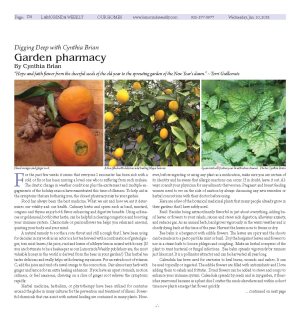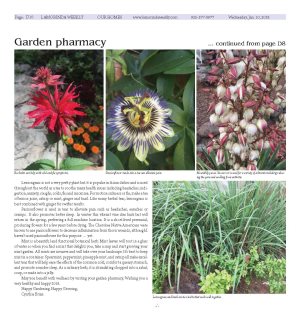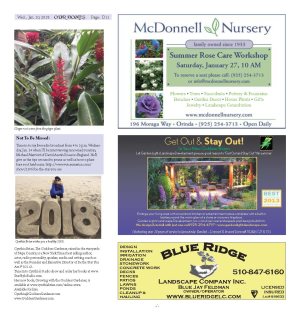|
|
Published January 10th, 2018
|
Digging Deep with Cynthia Brian
|
| Garden pharmacy |
| By Cynthia Brian |
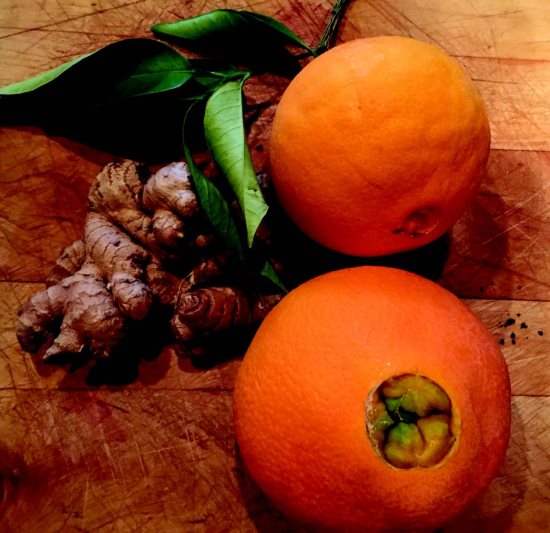 |
| Navel oranges and ginger root. |
"Hope and faith flower from the cheerful seeds of the old year to the sprouting garden of the New Year's dawn." ~Terri Guillemets
 For the past few weeks it seems that everyone I encounter has been sick with a cold or flu or has been nursing a loved one who is suffering from such malaise. The drastic change in weather conditions plus the excitement and multiple engagements of the holiday season have exacerbated this time of illnesses. To help aid in the symptoms that are bothering you, the closest pharmacy may be your garden.
For the past few weeks it seems that everyone I encounter has been sick with a cold or flu or has been nursing a loved one who is suffering from such malaise. The drastic change in weather conditions plus the excitement and multiple engagements of the holiday season have exacerbated this time of illnesses. To help aid in the symptoms that are bothering you, the closest pharmacy may be your garden.
 Food has always been the best medicine. What we eat and how we eat it determines our vitality and our health. Culinary herbs and spices such as basil, mustard, oregano and thyme enjoy both flavor enhancing and digestive benefits. Using echinacea or goldenseal, both bitter herbs, can be helpful in clearing congestion and boosting your immune system. Chamomile or passionflower tea helps you relax and unwind, quieting your body and your mind.
Food has always been the best medicine. What we eat and how we eat it determines our vitality and our health. Culinary herbs and spices such as basil, mustard, oregano and thyme enjoy both flavor enhancing and digestive benefits. Using echinacea or goldenseal, both bitter herbs, can be helpful in clearing congestion and boosting your immune system. Chamomile or passionflower tea helps you relax and unwind, quieting your body and your mind.
 A natural remedy to soothe a sore throat and still a cough that I have been using for decades in my work as an actor is a hot tea brewed with a combination of grated ginger, torn mint leaves, the juice, rind and leaves of a Meyer lemon mixed with honey. (If you are fortunate to be a beekeeper as our Lamorinda Weekly publishers are, the most valuable honey in the world is derived from the bees in your garden!) This herbal tea tastes delicious and really helps with clearing my sinuses. For an extra boost of vitamin C, add the juice and rind of a naval orange to the concoction. Pair almost any herb with ginger and lemon for an extra healing enhancer. If you have an upset stomach, motion sickness, or feel nauseous, chewing on a slice of ginger root relieves the symptoms rapidly.
A natural remedy to soothe a sore throat and still a cough that I have been using for decades in my work as an actor is a hot tea brewed with a combination of grated ginger, torn mint leaves, the juice, rind and leaves of a Meyer lemon mixed with honey. (If you are fortunate to be a beekeeper as our Lamorinda Weekly publishers are, the most valuable honey in the world is derived from the bees in your garden!) This herbal tea tastes delicious and really helps with clearing my sinuses. For an extra boost of vitamin C, add the juice and rind of a naval orange to the concoction. Pair almost any herb with ginger and lemon for an extra healing enhancer. If you have an upset stomach, motion sickness, or feel nauseous, chewing on a slice of ginger root relieves the symptoms rapidly.
 Herbal medicine, herbalism, or phytotherapy have been utilized for centuries around the globe in many cultures for the prevention and treatment of illness. Powerful chemicals that can assist with natural healing are contained in many plants. However, before ingesting or using any plant as a medication, make sure you are certain of its identity and be aware that allergic reactions can occur. If in doubt, leave it out. Always consult your physician for any ailments that worsen. Pregnant and breast feeding women need to err on the side of caution by always discussing any new remedies or herbal concoctions with their doctor before using.
Herbal medicine, herbalism, or phytotherapy have been utilized for centuries around the globe in many cultures for the prevention and treatment of illness. Powerful chemicals that can assist with natural healing are contained in many plants. However, before ingesting or using any plant as a medication, make sure you are certain of its identity and be aware that allergic reactions can occur. If in doubt, leave it out. Always consult your physician for any ailments that worsen. Pregnant and breast feeding women need to err on the side of caution by always discussing any new remedies or herbal concoctions with their doctor before using.
 Here are a few of the botanical medicinal plants that many people already grow in their gardens that I have safely used.
Here are a few of the botanical medicinal plants that many people already grow in their gardens that I have safely used.
 Basil: Besides being extraordinarily flavorful in just about everything, adding basil leaves or flowers to your salads, sauces and stews aids digestion, alleviates anxiety, and reduces gas. As an annual herb, basil grows vigorously in the warm weather and is slowly dying back at this time of the year. Harvest the leaves now to freeze or dry.
Basil: Besides being extraordinarily flavorful in just about everything, adding basil leaves or flowers to your salads, sauces and stews aids digestion, alleviates anxiety, and reduces gas. As an annual herb, basil grows vigorously in the warm weather and is slowly dying back at this time of the year. Harvest the leaves now to freeze or dry.
 Bee balm is a bergamot with edible flowers. The leaves are spicy and the shoots can be made into a pesto just like mint or basil. Dry the bergamot leaves and flowers to use in a steam bath to loosen phlegm and coughing. Make an herbal compress of the plant to treat bacterial or fungal infections. Bee balm spreads vigorously by runners just like mint. It is a pollinator attractor and can be harvested all year long.
Bee balm is a bergamot with edible flowers. The leaves are spicy and the shoots can be made into a pesto just like mint or basil. Dry the bergamot leaves and flowers to use in a steam bath to loosen phlegm and coughing. Make an herbal compress of the plant to treat bacterial or fungal infections. Bee balm spreads vigorously by runners just like mint. It is a pollinator attractor and can be harvested all year long.
 Calendula has been used for centuries to heal burns, wounds and rashes. It can be used topically or ingested. The edible flowers are filled with antioxidants and I love adding them to salads and frittatas. Dried flowers can be added to stews and soups to enhance your immune system. Calendula spreads by seeds and in my garden, it flourishes yearround because as a plant dies I scatter the seeds elsewhere and within a short time new plants emerge that flower quickly.
Calendula has been used for centuries to heal burns, wounds and rashes. It can be used topically or ingested. The edible flowers are filled with antioxidants and I love adding them to salads and frittatas. Dried flowers can be added to stews and soups to enhance your immune system. Calendula spreads by seeds and in my garden, it flourishes yearround because as a plant dies I scatter the seeds elsewhere and within a short time new plants emerge that flower quickly.
 Lemongrass is not a very pretty plant but it is popular in Asian dishes and is used throughout the world as a tea to soothe many health issues including headaches, indigestion, anxiety, coughs, colds, flu and insomnia. For motion sickness or flu, make a tea of lemon juice, catnip or mint, ginger and basil. Like many herbal teas, lemongrass is best combined with ginger for swifter results.
Lemongrass is not a very pretty plant but it is popular in Asian dishes and is used throughout the world as a tea to soothe many health issues including headaches, indigestion, anxiety, coughs, colds, flu and insomnia. For motion sickness or flu, make a tea of lemon juice, catnip or mint, ginger and basil. Like many herbal teas, lemongrass is best combined with ginger for swifter results.
 Passionflower is used in teas to alleviate pain such as headaches, earaches or cramps. It also promotes better sleep. In winter this vibrant vine dies back but will return in the spring, preferring a full sunshine location. It is a short-lived perennial, producing flowers for a few years before dying. The Cherokee Native Americans were known to use passionflowers to decrease inflammation from thorn wounds, although I haven't used passionflower for this purpose ... yet.
Passionflower is used in teas to alleviate pain such as headaches, earaches or cramps. It also promotes better sleep. In winter this vibrant vine dies back but will return in the spring, preferring a full sunshine location. It is a short-lived perennial, producing flowers for a few years before dying. The Cherokee Native Americans were known to use passionflowers to decrease inflammation from thorn wounds, although I haven't used passionflower for this purpose ... yet.
 Mint is a beautiful and functional botanical herb. Mint leaves will root in a glass of water so when you find a mint that delights you, take a snip and start growing your mint garden. All mints are invasive and will take over your landscape. It's best to keep mint in a container. Spearmint, peppermint, pineapple mint, and catnip all make excellent teas that will help ease the effects of the common cold, comfort a queasy stomach, and promote sounder sleep. As a culinary herb, it is stimulating chopped into a salad, soup, or made into a jelly.
Mint is a beautiful and functional botanical herb. Mint leaves will root in a glass of water so when you find a mint that delights you, take a snip and start growing your mint garden. All mints are invasive and will take over your landscape. It's best to keep mint in a container. Spearmint, peppermint, pineapple mint, and catnip all make excellent teas that will help ease the effects of the common cold, comfort a queasy stomach, and promote sounder sleep. As a culinary herb, it is stimulating chopped into a salad, soup, or made into a jelly.
 May you benefit with wellness by visiting your garden pharmacy, Wishing you a very healthy and happy 2018.
May you benefit with wellness by visiting your garden pharmacy, Wishing you a very healthy and happy 2018.
 Happy Gardening. Happy Growing,
Happy Gardening. Happy Growing,
 Cynthia Brian
Cynthia Brian
 Not To Be Missed:
Not To Be Missed:

 Tune in to my live radio broadcast from 4 to 5 p.m. Wednesday, Jan. 24 when I'll be interviewing renowned rosarian, Michael Marriott of David Austin Roses in England. He'll give us the tips we need to prune as well as how to plant bare root heirlooms.
http://www.voiceamerica.com/show/2206/be-the-star-you-are
Tune in to my live radio broadcast from 4 to 5 p.m. Wednesday, Jan. 24 when I'll be interviewing renowned rosarian, Michael Marriott of David Austin Roses in England. He'll give us the tips we need to prune as well as how to plant bare root heirlooms.
http://www.voiceamerica.com/show/2206/be-the-star-you-are


|
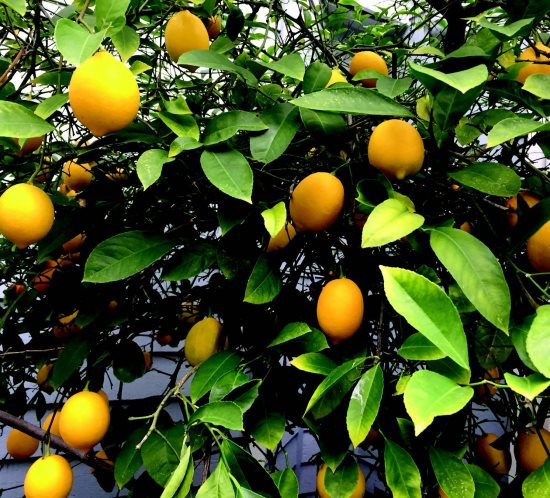 |
| A tree filled with delicious and healing Meyer lemons. |
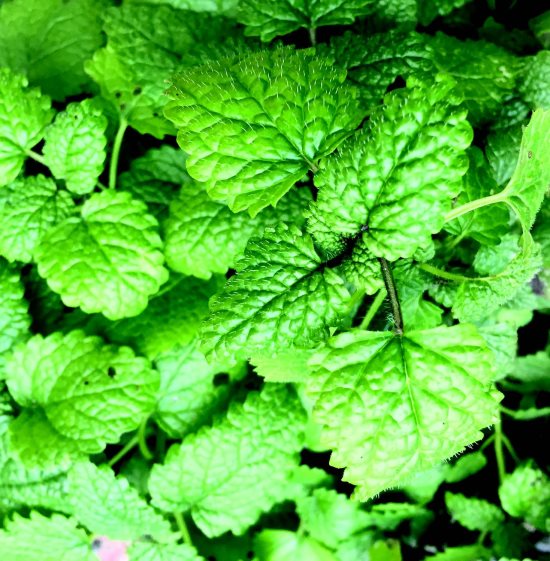 |
| Spearmint will freshen your breath when chewed. Photos Cynthia Brian |
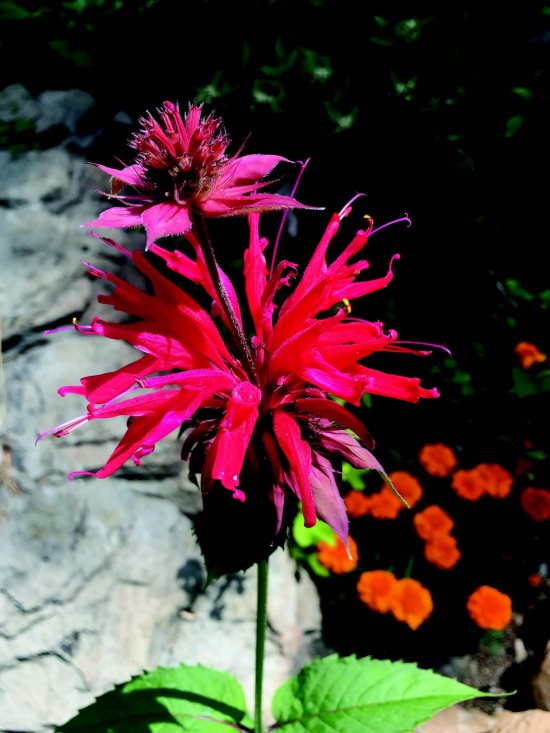 |
| Bee balm can help with cold and flu symptoms. |
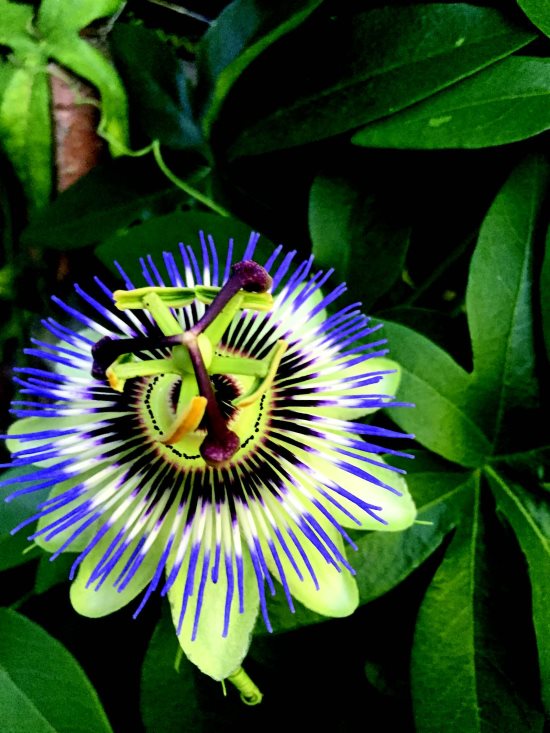 |
| Passionflower made into a tea can alleviate pain. |
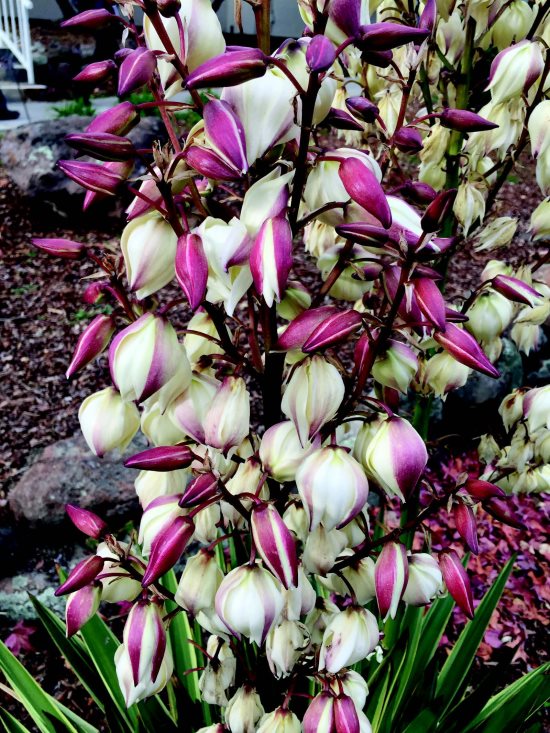 |
| Moundlily yucca. Yucca root is used
for a variety of ailments including reducing the pain and swelling
from arthritis. |
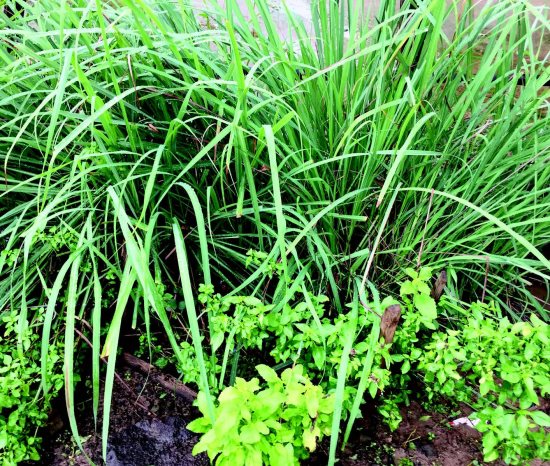 |
| Lemongrass and basil are two herbs
that work well together. |
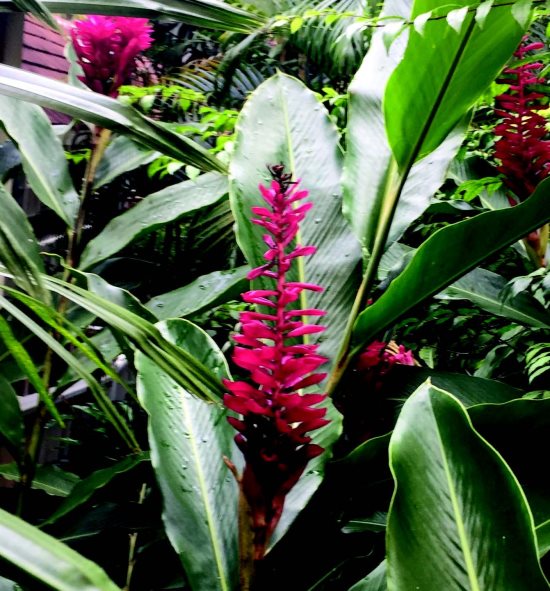 |
| Ginger root comes from the ginger
plant. |
 |
| Cynthia Brian wishes you a healthy
2018. Cynthia Brian, The Goddess Gardener, raised in the vineyards of
Napa County, is a New York Times best selling author, actor, radio
personality, speaker, media and writing coach as well as the Founder
and Executive Director of Be the Star You Are1(r) 501 c3. Tune into
Cynthia's Radio show and order her books at
www.StarStyleRadio.com.
Her new book, Growing with the Goddess Gardener, is available at
www.cynthiabrian.com/online-store. Available for hire.
Cynthia@GoddessGardener.com
www.GoddessGardener.com
|
| |
| |
| |
|
|
|











